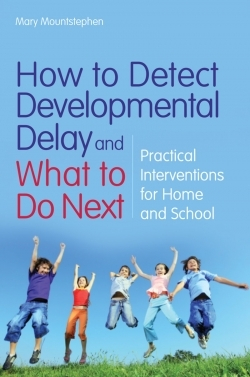How to Detect Developmental Delay and What to Do Next
Practical Interventions for Home and School
For frustrated parents who suspect that their children may have a developmental delay, there’s help—and hope—with this sound guidebook. Recognizing that parents know their children best and that “healthy child development is often taken for granted,” Mountstephen begins with a look at pregnancy and early brain development, genetic and environmental factors that can affect development, and the impact of problems with primitive and postural reflexes in infants. She continues with a chapter on developmental milestones up to twelve years old and how they can be used to determine if there is reason to be concerned about a child’s progress. The author also introduces three of the most common learning difficulties, dyslexia, dyspraxia, and Attention Deficit Hyperactivity Disorder, along with symptom checklists for each.
The second half of the book focuses on intervention. A chapter on movement and learning emphasizes a neurodevelopmental approach to learning difficulties and early intervention, along with balance, movement programs, and positive self-esteem strategies and how they are linked to academic achievement. Identifying vision as more than simply being able to see clearly and auditory processing as more than just being able to hear clearly, Mountstephen explains the importance of each of these skills and provides checklists to identify potential problems and strategies (i.e., the Johansen Individualized Auditory Stimulation) for overcoming them. The final chapter describes the role of an educational psychologist in identifying learning difficulties, as well as some of the assessments, feedback, and referrals they use.
An educational and neurodevelopmental delay specialist in private practice in the UK and an international consultant on special needs children, Mountstephen has taught in schools where all the students had been identified with learning difficulties. Although her background is in British education, readers will have no problems relating the author’s research and advice to American school systems.
The author incorporates numerous composites, based on actual students, which allow parents to recognize similar traits in their own children. She also includes extensive charts, checklists, tips, and sample student reports. Addressing the causes in addition to the symptoms of developmental delays, Mountstephen aids parents in tackling their children’s concerns with appropriate strategies. She doesn’t just want to label children, but help them find success in the world around them.
Reviewed by
Angela Leeper
Disclosure: This article is not an endorsement, but a review. The publisher of this book provided free copies of the book and paid a small fee to have their book reviewed by a professional reviewer. Foreword Reviews and Clarion Reviews make no guarantee that the publisher will receive a positive review. Foreword Magazine, Inc. is disclosing this in accordance with the Federal Trade Commission’s 16 CFR, Part 255.

